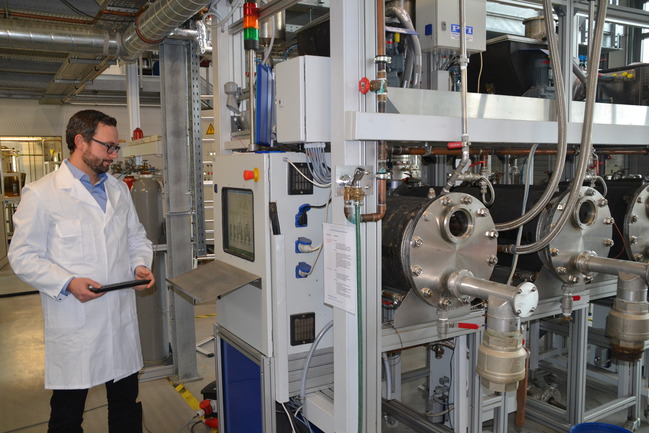Use of cookies
Cookies help us to provide our services. By using our website you agree that we can use cookies. Read more about our Privacy Policy and visit the following link: Privacy Policy

About 2,000 square metres of farmland is being destroyed everyday worldwide due to salination. The main reason for this is artificial irrigation because water-soluble salts deposit in the soil as a result of evaporation. Conventional cultivated plants do not survive salination.
The German-Wallonian CORNET project SaliChem focused on finding a solution to this problem by doing research on the use of salt-tolerant plants. So-called halophytes are able to provide biomass in order to generate energy. They are also able to produce plant extracts for the pharmaceutical and food industry and to manage soil remediation. Therefore, the research results are of great interest on a worldwide level. It is predicted that if only 10 % of the areas in Europe being oversalted were used for the cultivation of plants that produce biogas, a market volume of 1.4 billion Euro could be generated.


Within SaliChem, the goal was to achieve a complete process chain, starting from knowing where and how to grow halophytes in Europe, to an optimum extraction of biologically active plant extracts for the pharmaceutical and food industry and a final biomass valorisation through sequential chemical and energy production. For all steps the theoretical, technical, practical and economic aspects were taken into account. Multiple halophytes were evaluated in a first screening and the promising species Spartina maritima was used for the complete valorisation chain. Using the generated knowledge, it is possible to generate new concepts of crop cultivation in areas that are unused today and that will become salinised in the future.
The Walloon project partner CELABOR with profound expertise in phytochemical extraction was in charge of identifying valuable extractable compounds with biological activity, e.g. antioxidative power. The Prüf- und Forschungsinstitut Pirmasens e.V. (PFI) used its know-how to identify the chemical composition of the halophyte biomass and its biogas potential. Due to the sequential nature of the processing steps both partners worked on revealing synergistic and antagonistic effects.

Spartina maritima was chosen from a selection of halophytes to be exploited through the biorefinery approach. Spartina maritima is a perennial cordgrass and grows along Europe’s coastal regions. During the project, the plant was grown without salt stress and even under these conditions, the extract was rich in highly valuable lipophilic compounds. Chemical characterisation reported the presence of carotenoids (mainly lutein and β-carotene), phytosterols, tocopherols and fatty acids (mainly α-linolenic acid). As described in the literature, induced salt stress can elevate the formation of plant secondary metabolites (PSM) in halophytes. The yield of lutein was significant (higher than the richest vegetable source of lutein) without any salt stress induced. The produced extracts were screened for various types of biological activity (antioxidant, antimicrobial and anti-aging). Interesting results were obtained with Spartina lipophilic extract concerning anti-elastase and anticollagenase inhibition. The extract could be used as a new ingredient for skin-care products.
As was also shown in the project, Spartina maritima has high cellulose and xylan content that can be exploited for saccharification. The levels of cellulose and xylan were comparable to other second-generation feedstocks, such as wheat straw or corn stover. Thermal Pressure Hydrolysis technology (TPH), developed by PFI, led to a hydrolysis of the hemicellulose fraction. Extraction prior to pretreatment showed a synergistic effect on the pretreatment, possibly due to reduction of hydrophobicity. Higher xylose yields could be observed compared to pretreatment without prior extraction. The ethanol fermentation with Spartina maritima hydrolysate was superior over the standard medium. The influence of nutrients on the fermentation needs to be investigated.
An additional synergistic effect could be observed when extracted Spartina maritima biomass was used for biogas production. An increase of 43 % in biogas yield could be observed compared to untreated Spartina maritima.

Through the synergistic effects of extraction and biomass processing, economic advantages can be exploited for biorefinery concepts, benefitting the whole valorisation chain from the agricultural sector to the cosmetic, chemical and biogas industries. The biomass processing intensity is reduced and biogas formation improved by the extraction process. Furthermore, the additional income obtained through the high value extract can alleviate the relatively high costs of biomass conversion to platform chemicals. The worldwide market for lutein was worth roughly 233 million US $ in 2010 and is expected to grow to 308 million US $ in 2018. Spartina maritima represents an attractive alternative to Marigold, the current source for lutein extraction, since Spartina maritima accumulates lutein in the whole plant and Marigold only in one organ, leading to a simplified harvest and potential higher yield per area.
2015-2016
PFI – Prüf- und Forschungsinstitut Pirmasens e.V. (Coordinating Association and Research Performer)
CELABOR – Centre de Recherche et de Contrôle agro-alimentaire, emballage, environnement, papetier et textile (Association and Research Performer)
Pictures: © H. Janse, Netherlands (picture 1, highlighting the article), other pictures: Prüf- und Forschungsinstitut Pirmasens e.V. (PFI)